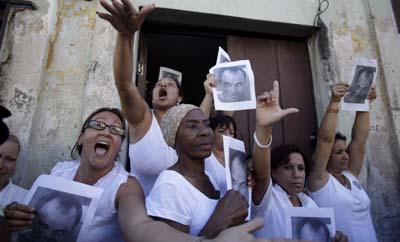When the last of 29 journalists jailed in a notorious 2003 crackdown was finally freed this year, it signaled to many the end of a dark era. But Cuban authorities are still persecuting independent journalists through arbitrary arrests, beatings, and intimidation. A CPJ special report by Karen Phillips
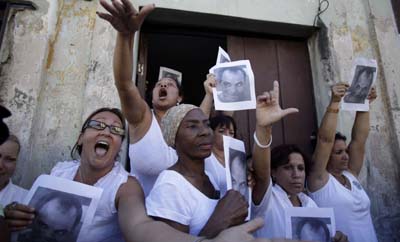
Published July 6, 2011
Juan González Febles, director of the independent news website Primavera Digital, was running an errand last spring when he came upon a news story: Police were climbing onto his neighbors’ roofs in Havana to remove satellite television dishes that the government considers illegal because they pick up uncensored stations from abroad.
When Febles started taking pictures with his cell phone, officers quickly arrested him and took him to a neighborhood police station, where he was held for seven hours and made to erase all of his photos of the dish seizures, a highly unpopular police activity. Febles, a former librarian who took up independent journalism in 1998 and now runs the overseas-hosted website, told CPJ that he has become accustomed to detentions, which number in the dozens over the years, but that he is still bothered that his phone is tapped and that he’s followed by security agents in the streets. The agents sometimes stop him, Febles said, and relay what they’ve heard in his private phone conversations.
More in this report
• CPJ’s recommendations
• In exile, a tenuous home
In print
• Download the pdf
In other languages
• Español
On the CPJ Blog
• Stories of prison
and liberation
Such is the state of repression in Cuba today. As President Raúl Castro’s government seeks greater international engagement, it has freed in the last year more than 20 imprisoned independent journalists and numerous other political detainees who had been held since the notorious Black Spring crackdown of 2003. Government officials talk of political and economic reform, pointing to a plan to introduce high-speed Internet service to the island this summer. But though the government has changed tactics in suppressing independent news and opinion, it has not abandoned repressive practices intended to stifle the free flow of information.
A CPJ investigation has found that the government persists in aggressively persecuting critical journalists with methods that include arbitrary arrests, short-term detentions, beatings, smear campaigns, surveillance, and social sanctions. Today’s tactics have yet to attract widespread international attention because they are lower in profile than the Black Spring crackdown, but the government’s oppressive actions are ongoing and significant.
CPJ examined government activities in March and April 2011, two months with sensitive political milestones, and found that journalists were targeted in more than 50 instances of repression. The majority of cases involved arrests by state security agents or police officers, according to CPJ research and documentation by the Cuban Commission on Human Rights and National Reconciliation and Hablemos Press, a news agency that focuses on human rights. Most frequently, these journalists were detained on their way to cover a demonstration or political event and were held in local police stations for hours or days. In at least 11 cases, the arrests were carried out with violence, CPJ research shows.
During this period, more than a dozen journalists endured house arrest, preventing them from reporting on the Communist Party Congress in April and the eighth anniversary in March of the Black Spring crackdown that led to the imprisonment of dozens of journalists and dissidents. Although no journalists have been sentenced to lengthy prison terms in the last year, Cuban authorities in May ominously sentenced six political dissidents to prison sentences of two to five years.
“Political repression in Cuba has undergone a metamorphosis,” said Elizardo Sánchez Santa Cruz, president of the Cuban Commission on Human Rights and National Reconciliation. “Before, repression was based on long prison sentences. Although the Cuban government still subjects dissidents to jail terms, it has changed substantially from the Black Spring, which was characterized by long-term sentences.” More typical now, he said, “are many arrests by the political police, lasting hours, days, or weeks.”
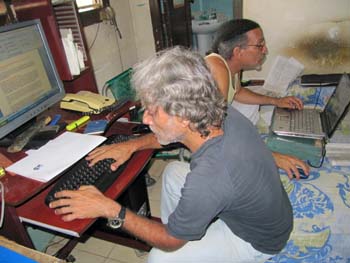
Perhaps counter-intuitively, the scheduled arrival of broadband Internet is not expected to improve free expression or access to information. Because the project will improve the island’s relatively few existing Internet connections—which are predominantly in government offices, universities, and other officially approved locations—but not extend connectivity to the general public, the government and its legion of online bloggers will gain an even greater technological advantage over critical voices. Independent journalists will be forced to continue to use expensive Internet access at hotels, pirated connections bought on the black market, or the politically-tinged access offered at foreign embassies.
“Official bloggers already benefit from free or low-cost Internet connections,” said Laritza Diversent, a lawyer and an independent blogger. “Now, they will have the advantage of a high-speed connection as well.”
A vast, repressive legal structure
Magaly Norvis Suárez, a correspondent with Hablemos Press, has been detained three times this year by police and state security agents. On one occasion, she was slapped and kicked by police officers. Another time, officers took her ID card and held it for several days, essentially condemning her to house arrest because the law requires individuals to carry identification in public. During one detention, security agents told her that if she continued to practice journalism, she could be imprisoned and lose custody of her children. Her 15-year-old daughter was harassed so relentlessly at school that she dropped out.
Speaking with CPJ from Havana, Norvis Suárez said the psychological impact is significant. “It’s very difficult to work under the threat of imprisonment,” she said, “wondering if I’m imprisoned, what will happen to my family, my husband, my house.” Talk of political reform aside, the laws that have allowed Cuba to imprison reporters remain very much in place. They are written in Article 91 of the penal code, which imposes lengthy prison sentences or death for those who act against “the independence or the territorial integrity of the state,” and Law 88 for the Protection of Cuba’s National Independence and Economy, which imposes up to 20 years in prison for committing acts “aimed at subverting the internal order of the nation and destroying its political, economic, and social system.”
This restrictive legal framework applies to the flow of news and information itself. All authorized domestic news media are controlled by the Communist Party, which recognizes freedom of the press only “in accordance with the goals of the socialist society.” Domestic news outlets are state-owned and supervised by the Communist Party’s Department of Revolutionary Orientation. Online information is restricted by an inter-ministry commission charged with “regulating the information that comes from worldwide information webs.” Article 19 of Resolution 179 of 2008 of the Ministry of Communication and Computing states that Internet service providers are obligated to “adopt the necessary measures to impede access to sites with content that is contrary to social interest, ethics, and good customs; as well as the use of applications that affect the integrity and security of the state.”
Independent journalists are forced to operate outside this official framework. News websites such as Hablemos Press and Primavera Digital are hosted overseas, with editors in Cuba uploading articles and updating the sites at embassies or hotels. Other independent journalists file stories, often by email, to news websites such as Cubanet and Diario de Cuba that are based and edited overseas, often by Cuban exiles. Still other independent journalists operate their own blogs, which are hosted overseas and updated through embassies or costly hotel connections.
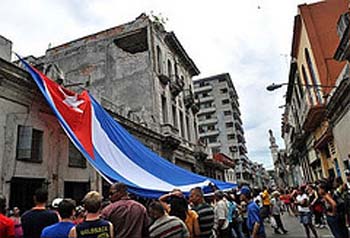
Independent journalists pay another high price: They continue to be subjected to “acts of repudiation,” the term for rallies at which government supporters gather outside the homes of people perceived as being critical of the state. In extreme cases, journalists and political dissidents are prevented from leaving their homes by chanting crowds of government supporters, as was the case with a large demonstration held on the eighth anniversary of the Black Spring crackdown. Héctor Maseda Gutiérrez, a recently freed independent journalist and recipient of the 2008 CPJ International Press Freedom Award, and his wife, Laura Pollán, a well-known human rights defender, told CPJ that more than 200 pro-government supporters had gathered outside their home. The couple was hosting a gathering of newly freed political prisoners and members of the Ladies in White, a group composed of the former prisoners’ spouses and other loved ones. The demonstrators stayed for two days, playing the national anthem and revolutionary songs at high volume from loud speakers and preventing anyone from leaving the gathering.
State television and, increasingly, the Internet have provided platforms for smear campaigns against critical journalists and dissidents. The government proudly announced in February that it had enlisted roughly 1,000 bloggers to denounce critical journalists; many of these “official” bloggers are government employees, and all enjoy easy, low-cost access to official Internet connections.
A slickly produced new television series, “Las Razones de Cuba,” which is also streamed online, presents independent journalists and dissidents as enemies of the state. Using fuzzy footage of “suspicious” activities (such as journalists entering a foreign embassy), a menacing soundtrack, and interviews with official “experts,” the program seeks to portray critics as criminals bent on toppling the state. Journalist Dagoberto Valdés, who directs the online newsmagazine Convivencia, and the prominent blogger Yoani Sánchez have been singled out on the program.
A digital battle for free expression
Perhaps surprisingly in a country with few private Internet connections—overall penetration is said to be only about 14 percent—the struggle for free expression is being waged almost exclusively in digital media. Despite the many hurdles to online access, Cuba has a vibrant alternative blogosphere that consists of about 40 critical journalistic blogs, all of which are hosted on overseas servers. Blogging and increasingly Twitter offer platforms not only for reflection, analysis, and reporting, but also for responding to government smears.
In response to “Las Razones de Cuba,” the blogger Sánchez has produced her own talk show, “Las Razones Ciudadanas” which is video-streamed online. In each episode, civil society members discuss topics such as independent journalism. Reinaldo Escobar, a blogger and the husband of Sánchez, noted in one episode that the advent of mobile telephones had transformed independent journalism on the island, allowing witnesses and sources to communicate more easily with journalists and enabling reporters to post content on Twitter. It was only in 2008 that the government allowed consumer sales of personal electronic goods such as mobile phones.
“Twitter is the true protective shield for the independent press and alternative bloggers in Cuba,” said the exiled Cuban journalist Manuel Vázquez Portal, himself a former political prisoner. Still, sending a text or posting a Twitter message from a cell phone is costly, about US$1 in a country where the average monthly income is equivalent to US$15 to US$30. Government supporters have been quick to use Twitter as well. For each Twitter message critical of state policy, there is an onslaught of disparaging messages from pro-government users.
The government has been intent on keeping digital access tilted in its favor. Private Internet connections are rare in Cuba. Resolution 180 of 2003 allows only those with Cuban convertible currency—a monetary form generally used by foreigners—to obtain individual Internet access, which must be approved by the government-owned Internet service provider ETECSA. Government officials, intellectuals with government ties, and some academics and doctors are among the relatively few Cubans with authorized passwords to the state’s Internet service.
Cubans without private connections can turn to state-run Internet cafés, but users there can expect identity checks, heavy surveillance, and restrictions on access to non-Cuban sites. The cost of uncensored connections at hotels is about US$8 per hour; government-issued Internet passwords can be purchased on black market sites, but they, too, are expensive and are monitored for political content. Many journalists interviewed by CPJ make daily or weekly trips to foreign embassies to use free Internet connections, a practice that puts them under further government scrutiny. Journalists working in the provinces, with few hotels and no embassies, have an even harder time accessing the Web.
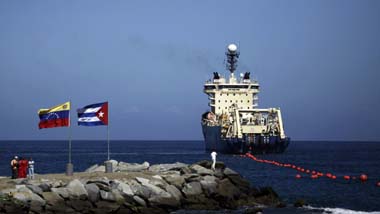
A US$70 million fiber-optic cable project, financed by the Venezuelan government and laid this year by the French company Alcatel-Lucent, is likely to tilt the field even more in the government’s direction. The project, scheduled to become operational this summer, will increase Internet connection speeds exponentially but will have limited reach, improving existing connections in government offices, universities, and other official sites rather than increasing overall connectivity, according to the official newspaper Granma. (The importance the Cuban government attaches to restrictive connectivity was evident in the December 2009 arrest of Alan Gross, a contractor for the U.S. Agency for International Development who is serving a 15-year sentence on charges of illegally helping Cubans set up Internet connections.)
“While the introduction of broadband is potentially a giant step forward for connectivity, if it is implemented under the same rules of control, suspicion, and institutional access it could very well be used as another mechanism of control,” said Ted Henken, a Cuba expert and professor of black and Hispanic studies at City University of New York. In April, Henken was detained by state security agents and told he could not return to the island after he had met with independent Cuban bloggers.
On reform, talk but little action
The government has been unwilling to turn away from its longstanding suppression of free speech—even as its leaders talk of economic and political change. In fall 2010, President Castro announced plans to reduce the state work force by more than half a million employees and increase licenses for private enterprises. By March 2011, 171,000 new private business licenses had been issued, press reports said, although independent economists told CPJ that high fees and a shortage of raw materials were stifling the effort. During the Communist Party Congress in April, Castro officially replaced his brother Fidel as head of the Communist Party in the first leadership change since the party’s founding in 1965. He also announced the introduction of term limits for party officials.
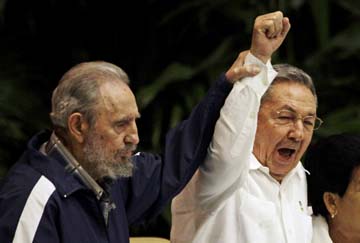
And in March, Cuba released the last of the 29 journalists imprisoned during the Black Spring crackdown, when the government swept up dozens of dissidents and handed them prison sentences of up to 27 years. The release of detainees followed negotiations between the Cuban government and the Catholic Church, with the help of Spanish diplomats. But freedom has not been without a high cost: Most of the freed journalists and their families were forced to leave their homeland for Spain, where their resettlement has been filled with economic and professional challenges. Three jailed journalists who refused to go into exile were released on a form of parole that leaves them vulnerable to re-arrest.
Cuban journalists and human rights defenders expressed great skepticism that economic changes on the island would be accompanied any time soon by improvements in press freedom. The experiences of independent reporter Dania Virgen García bolster that view.
“It seems like just about every two weeks they threaten me, they detain me, or I have to spend the night in jail,” said Virgen García, whose reporting appears on her blog and on the Miami-based news website Cubanet. “I know every police station in Havana.” Virgen García has faced arrest, smear campaigns, and physical assault for her reporting on human rights abuses and substandard prison conditions. Recently she awoke to a group of schoolchildren and teachers shouting pro-Castro slogans and insults outside her home.
In April, while on her way to cover a meeting of ex-political prisoners in Havana, Virgen García was arrested by state security agents and taken to La Lisa police station, she told CPJ in a phone interview. During the ordeal, she said, she was slapped on the face and manhandled by police agents and doused with pepper spray by a prison guard. Virgen García was released six hours later, but suffered extensive bruising and persistent eye inflammation.
If the revolving jailhouse door of low-level repression seems more benign than lengthy prison terms, the death in May of dissident Juan Wilfredo Soto gives one pause. Soto, a member of the Central Opposition Coalition and a former political prisoner, was arrested by two police officers when he refused to leave a public park. After handcuffing Soto, police beat him with batons, according to independent Cuban press reports. Soto was released from custody but died days later from what officials called “multiple organ failure due to pancreatitis,” an assertion met with disbelief by independent journalists and opposition groups. International rights groups and governments called on Cuban authorities to commission an independent inquiry, but Havana did not publicly respond.
Among those calling for an independent investigation was the European Parliament, illustrating the sometimes-conflicting impulses on both sides of the Atlantic. Although the European Union restricted diplomatic relations and development cooperation with Cuba from 2003 to 2008, the EU has since opened a political dialogue with Havana, and the European Commission has provided the island with millions in aid. In 2010, the Commission allocated 20 million euros (US$28.5 million) for food security, environmental adaptation, and professional and academic exchanges, according to the European External Action Service.
But Havana has yet to secure its most-sought goal with the EU: the undoing of the Common Position, an EU-wide policy adopted in 1996 that conditions full relations with the island on Havana’s progress on human rights and democracy. The repeal of the Common Position would normalize diplomatic relations and solidify development cooperation for the long term. In February, Cuba’s minister of foreign affairs, Bruno Rodríguez, met in Brussels with the EU’s foreign affairs chief, Catherine Ashton, for the fifth in a series of meetings begun in 2008 to explore the future of EU-Cuba relations. Reiterating Havana’s long-held position, Rodríguez said relations should be normalized without “interference in the internal affairs of states,” international press reports said. The intransigence implied by such a statement does not bode well for human rights or press freedom.
“There are a lot of obstacles to normalizing relations at this time,” said Susanne Gratius, an expert on EU-Latin American policy at FRIDE, a Madrid-based foreign policy institute. As obstacles, she cited “the authoritarian nature of the regime, human rights, and political rights, where there has been no change despite the recent economic reforms.” To repeal the Common Position, Gratius noted, consensus would have to be reached among the EU’s 27 member states, which have divergent views on Cuba. Sweden, Poland, Germany, and the Czech Republic are particularly opposed to abandoning the Common Position on human rights and political grounds.
“It’s always the same story: You have some progress, and then you have a step back,” Gratius said of Cuba. “I think in the long run there is a movement toward political opening, but you still have these reversals that come with human rights abuses.”
Karen Phillips, a freelance writer, has served as CPJ’s journalist assistance associate and, most recently, as the research associate for CPJ’s Americas program.
CPJ’s Recommendations
To the Cuban government
• End the use of detention, physical violence, surveillance, and smear campaigns against independent journalists and bloggers.
• Repeal Article 91 of the penal code and Law 88 for the Protection of Cuba’s National Independence and Economy, provisions used by the government to unjustly imprison independent journalists and political dissidents.
• As a signatory to the International Covenant on Civil and Political Rights, fully meet the obligation to allow journalists to work freely and without fear of reprisal.
• Remove all legal barriers to individual Internet access, and allow bloggers to host their sites on Cuban domains.
• With the arrival of high-speed Internet, extend access to the population at large, including journalists and bloggers.
• Eliminate all conditions on the release of journalists detained during the Black Spring. Vacate parole for the newly freed journalists who remain in Cuba. Allow exiled journalists to return to the island without condition.
To the International Community
To the U.N. Human Rights Council
• Hold the Cuban government accountable for its obligations under the International Covenant on Civil and Political Rights.
• Urge Cuba to review trial processes and travel permit arrangements to ensure they conform to the International Covenant on Civil and Political Rights.
• The U.N. special rapporteur on freedom of expression should request authorization to assess the state of freedom of the press and freedom of expression in Cuba and report findings and recommendations.
To the European Union
• Press the government to heed its call to grant freedom of information and expression, including Internet access, to all Cubans.
• Urge Cuban authorities to lift conditions on newly released political prisoners so they are indeed free and not vulnerable to re-imprisonment.
• In the evaluation of the Common Position on Cuba, predicate future dialogue with Cuban authorities on substantial and specific improvements. Those improvements should include the implementation of international human rights covenants signed by Cuba, and the granting to all Cubans of freedom of expression and access of information through all media, including the Internet.
• Create a welcome environment throughout the European Union for Cuban dissidents released from prison but forced into exile. Facilitate their access to EU-funded social and training programs.
To the Organization of American States
• While Cuba has put aside rejoining the Organization of American States, any future participation in the OAS must ensure that Cuba conform to OAS principles, including the right to freedom of expression and access to information. In the event Cuba joins the OAS, the organization must ensure Cuba’s compliance with international freedom of expression standards.
• All OAS member states should promote a vigorous debate on human rights violations in Cuba, including restrictions to Internet access.
• The OAS rapporteur on freedom of expression should request authorization to assess the state of freedom of the press and freedom of expression in Cuba and report findings and recommendations.
To the technology and blogging community:
• Continue to support Cuban bloggers by publicizing their work and linking to their blogs.
• Companies that provide technology infrastructure to Cuba must ensure their work product is not used to restrict freedom of expression. Companies should follow the principles established by Global Network Initiative, which seeks to ensure that technology companies uphold international freedom of expression standards.
• Support social media applications that are popular in Cuba.
To the U.S. government:
• In accord with the April 2009 directive issued by President Barack Obama, the administration and Congress should allow U.S. companies that commit to Global Network Initiative principles to provide digital support and infrastructure to Cubans. The 2009 directive was intended to increase the free flow of information to the Cuban people and expand communications links between the United States and Cuba.
• Allow U.S. companies to establish fiber-optic cable and satellite telecommunications facilities linking the United States and Cuba.
• Encourage information technology and social media companies to enable Internet chat services in Cuba, as it is now allowed under U.S. regulations.
• Ensure that U.S. policy is open and transparent in relation to its support for dissidents.
